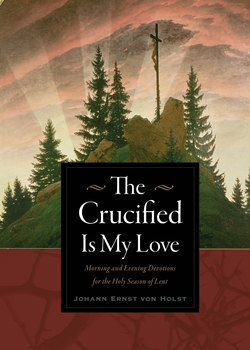Читать книгу The Crucified Is My Love - Johann Ernst von Holst - Страница 21
На сайте Литреса книга снята с продажи.
Оглавление13
Tuesday Morning
The Grain of Wheat
Now among those who went up to worship at the feast were some Greeks. So these came to Philip, who was from Bethsaida in Galilee, and asked him, “Sir, we wish to see Jesus.” Philip went and told Andrew; Andrew and Philip went and told Jesus. And Jesus answered them, “The hour has come for the Son of Man to be glorified. Truly, truly, I say to you, unless a grain of wheat falls into the earth and dies, it remains alone; but if it dies, it bears much fruit. Whoever loves his life loses it, and whoever hates his life in this world will keep it for eternal life. If anyone serves me, he must follow me; and where I am, there will my servant be also. If anyone serves me, the Father will honor him.”
John 12:20–26
WHEN THE LORD HAD ENTERED the forecourt of the temple after his solemn entry into Jerusalem, some Greeks also wanted to see Jesus. Just as after his birth the wise men from the east approached him, so now before his death these Greeks come as representatives of the nations of the world. Moved by the news of the raising of Lazarus, struck by the jubilation of the surging crowd, they expressed their wish to see the Lord – the very deep and mostly unconscious longing of all pagans and indeed of the whole human race.
Jesus himself saw in their coming the beginning of his future glorification, which was to reveal him not only as Israel’s Messiah but also as the head and savior of all nations. At the same time in the parable of the grain of wheat, he taught his hearers that his way to glory could only be through death. As at dawn the light of the coming day blends with the darkness of the night, here the Lord’s sadness over his approaching death was interwoven with the joyful hope of resurrection.
In the parable of the grain of wheat he points to Golgotha and the tomb in Joseph’s garden. When the divine grain of wheat was buried, his disciples surely thought of these words and began to sense something of their meaning. But it was also for us that the Lord went this way, and we should now go with him: that is, we should die with him, crucify our old nature at his cross, and finally sink into the earth, trusting in him. But our dying should also be illuminated by the assurance of a blessed resurrection.
In spring the grain of wheat that was sown awakens to new life, and all the other young blades of wheat shine with it in fresh green. They ripen and bear fruit in the light of the sun. It is the same with the highest form of nature: humankind. We also can only attain to new and more beautiful life through death and the grave. Even though the winter is long, the day of resurrection must come when this human seed, buried with so many tears, will awaken and bloom. The resurrection of Jesus Christ is our guarantee for this. If this heavenly grain of wheat had not fallen into the earth and died, then Christ would have remained alone, the unique God-man, highly exalted, apart from and above all other humans. But now, since he has died and risen from the dead, he bears fruit many thousandfold. All of us who live on earth as his redeemed, the church in whom he lives, gathered from all nations, and the countless hosts of the blessed in the heavenly paradise – all form the one nation, the one body of the Lord, the blessed fruit of his resurrection. And when finally spring comes and Easter morning dawns for those whose bodies rest in the earth, when they are raised in eternal transfiguration to live on the new earth under the new heaven, then the Lord Jesus Christ will be the sun that illuminates them and he will be glorified in all.
